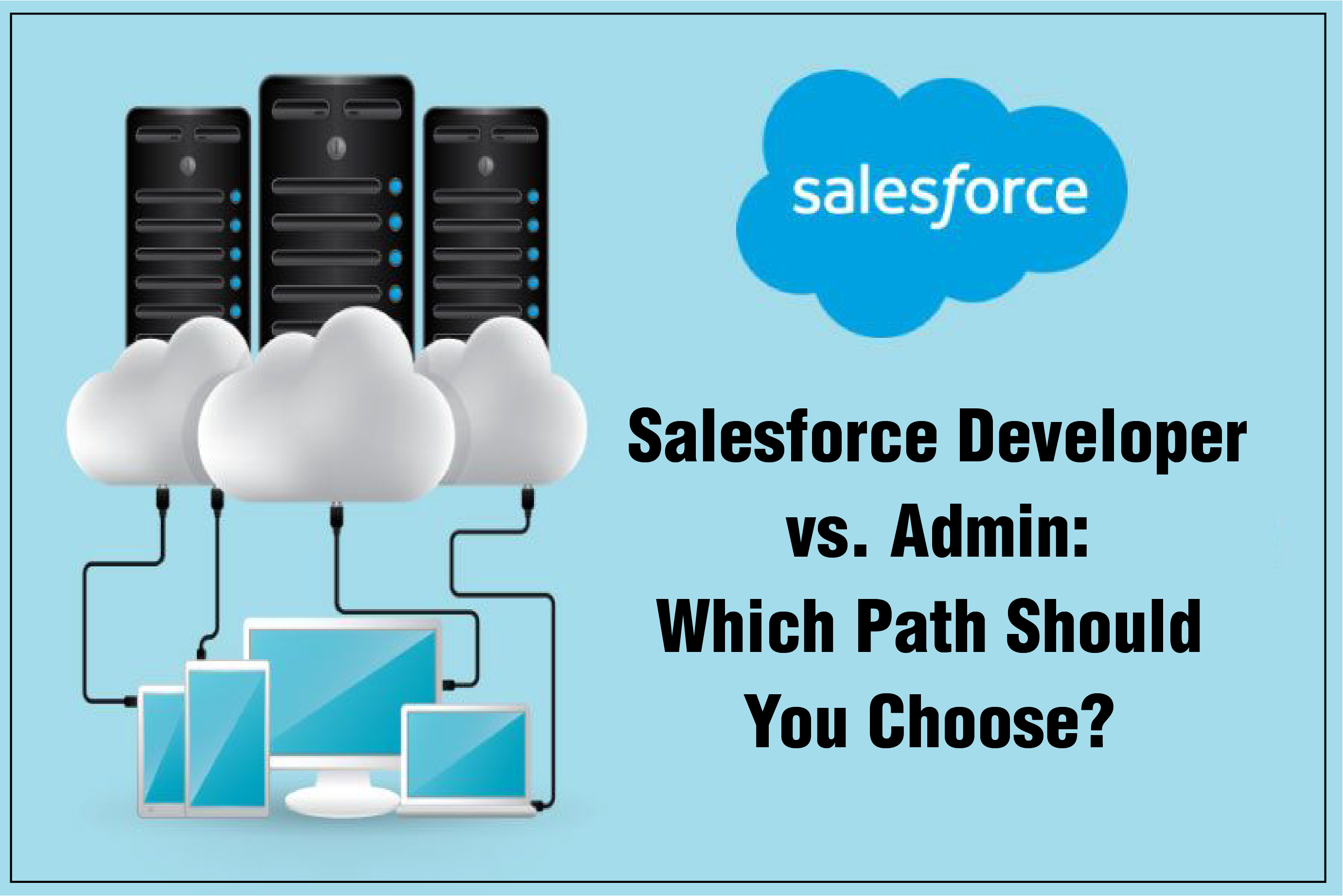Salesforce Developer vs. Admin: Which Path Should You Choose?
Admin
|
August 07, 2025

Are you contemplating a career in Salesforce and trying to decide between becoming a Salesforce Developer or a Salesforce Administrator? This is a common crossroads for many aspiring professionals. Both career paths are rewarding, but they cater to different skills, interests, and long-term goals. In this in-depth guide—brought to you by Gradient Infotech—we’ll explore each role, compare their responsibilities, required skills, career growth potential, and which path aligns best with your strengths and passions.
1. Understanding the Roles
Salesforce Administrator
A Salesforce Administrator is often the go-to expert for managing business users and
maintaining the Salesforce platform:
Day-to-day responsibilities: user setup, security management, data import/export,
workflow automation (using point-and-click tools), and generating
reports/dashboards.
Key skills: organizational strategy, communication with stakeholders, familiarity with
Salesforce features and problem-solving to streamline operations.
Certifications: Salesforce Certified Administrator and Advanced
Administrator—essential credentials recognized across the industry.
Salesforce Developer
On the other hand, a Salesforce Developer dives deeper into the technical aspects:
Core tasks: writing Apex code, developing Lightning Components (Aura or LWC),
integrating Salesforce with external systems, testing code, and deploying solutions.
Required skills: strong coding foundation (Apex, SOQL, JavaScript, HTML/CSS),
software architecture, debugging, version control (Git), and continuous integration
tools.
Certifications: Salesforce Certified Platform App Builder and Platform Developer I
& II—highly regarded badges for technical expertise.
2. Skillset Comparison
Skill / Domain Salesforce Admin Salesforce Developer
No-code tools ✅ Workflow, Process Builder,
Flow
❌ Limited use
Coding experience ❌ Not required ✅ Apex, SOQL, Lightning,
JavaScript
System configuration ✅ Custom fields, validation rules,
permissions
✅ Custom metadata, schema,
advanced setup
Integration knowledge ⚠️ Limited ✅ REST APIs, external system
integration
Report & dashboard
creation ✅ Strong skill ⚠️ Secondary skill
3. Which Path Fits You Best?
Choose Salesforce Admin if you:
Prefer non-code, visual tools (e.g., Flow, validation rules)
Love working closely with users and translating business needs into configuration
Enjoy analysing data and creating insightful dashboards
Choose Salesforce Developer if you:
Love writing code, debugging, and creating technical solutions
Are excited by integrations and architecting scalable systems
Want to stay up-to-date with developer frameworks like Lightning Web Components
4. Blended Roles: Admin-Developer Hybrid
Many organizations seek “Admin-Developers”, or professionals who can configure with
clicks and code when needed. This hybrid model provides:
Versatility: manage data or build custom apps
Career edge: wider job opportunities and recognition
Smooth progression: start as an Admin, move to App Builder, and then Developer
certifications
5. How to Decide
1. Self-assess your passions – Do you enjoy coding? Or do you gravitate toward
business-user support and analytics?
2. Take sample projects – Configure a Flow or build a simple visualforce page to test
the waters.
3. Excel in certifications – Begin with the Admin cert; if coding interests you, follow
with Platform App Builder or Dev I.
4. Learn from pros – Check out blogs, podcasts, meetups—especially here at Gradient
Infotech, where innovation meets mentorship!
6. How Gradient Infotech Can Help
At Gradient Infotech, we specialize in Salesforce training and recruitment:
Hands-on courses: Learn both Admin and Developer tracks from certified instructors
Mentorship programs: Get guided help with real-world projects
Hiring support: Our network helps you land roles that suit your skills
Whether you're leaning toward Admin, Developer, or the hybrid route, we tailor training to
your unique goals. Discover our offerings at gradientinfotech.com.
Conclusion
Choosing between Salesforce Developer vs. Admin comes down to your personal strengths.
If you enjoy coding and architecting systems, the Developer path offers exciting challenges
and greater technical depth. If matching user needs with business-smart configurations
appeals to you, Admin might be your perfect fit. Or take the hybrid route—becoming both
will maximize your marketability and career flexibility.
Whichever path you choose, Gradient Infotech is here to guide you every step of the
way—with expert instructors, real-world curriculum and career placement support.
Ready to get started? Explore our Salesforce Admin, Salesforce Developer or Combined
Training options on gradientinfotech.com, and take the first step toward a high-impact
Salesforce career!